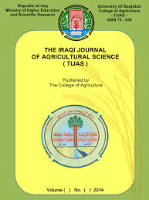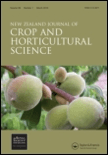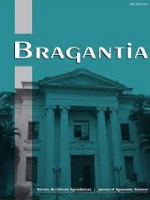
Iraqi Journal of Agricultural Sciences
Scope & Guideline
Fostering sustainable agriculture through open access research.
Introduction
Aims and Scopes
- Agricultural Biotechnology:
Research involving genetic engineering, molecular markers, and biotechnological applications in crop and livestock improvement. - Soil and Water Management:
Studies focusing on soil fertility, irrigation practices, and water conservation techniques to enhance agricultural productivity. - Crop Science and Production:
Investigations on various crop species, including their growth, yield, and response to fertilizers and environmental conditions. - Animal Husbandry and Livestock Management:
Research on breeding, feeding, and health management of livestock, emphasizing practices that improve productivity and animal welfare. - Plant Protection and Pest Management:
Studies on pest control methods, including chemical, biological, and integrated pest management strategies. - Environmental Impact Assessment:
Research assessing the effects of agricultural practices on the environment, including studies on pollution, biodiversity, and ecosystem health. - Agricultural Economics and Policy:
Economic analyses of agricultural practices, market trends, and policy impacts on farming and food security.
Trending and Emerging
- Sustainable Agriculture Practices:
An increasing emphasis on research promoting sustainability, including organic farming, agroecology, and conservation practices that enhance environmental health. - Nanotechnology in Agriculture:
Emerging studies focusing on the application of nanotechnology for enhancing crop yields, pest control, and soil health, indicating a significant trend in modern agricultural research. - Climate Change Adaptation Strategies:
Growing research addressing the impacts of climate change on agriculture, including studies on drought-resistant crops and adaptive management practices. - Food Safety and Quality Assurance:
An increasing number of studies are being published on food safety, quality control, and the impact of agricultural practices on food products. - Biological Control and Integrated Pest Management:
A trend towards sustainable pest management practices, including biological control methods and the integration of various pest management strategies.
Declining or Waning
- Traditional Farming Practices:
There has been a noticeable decrease in studies focusing on conventional farming methods, as research increasingly emphasizes sustainable and innovative practices. - Chemical Fertilizers and Pesticides:
Research on the use of chemical fertilizers and pesticides is declining as there is a growing shift towards organic farming and integrated pest management approaches. - Livestock Production Systems:
While still relevant, the frequency of studies exclusively focused on traditional livestock production systems appears to be waning in favor of more advanced biotechnological approaches.
Similar Journals

AGRONOMIA MESOAMERICANA
Empowering researchers to cultivate a greener tomorrow.AGRONOMIA MESOAMERICANA is a distinguished open-access journal published by UNIV COSTA RICA, dedicated to advancing knowledge in the fields of agronomy, crop science, food science, and soil science. Since its inception in 1990, the journal has provided a platform for researchers and professionals to disseminate their findings, contributing significantly to the agricultural sciences. With an E-ISSN of 2215-3608, it operates from Costa Rica, specifically from the Centro Investigaciones Agronómicas, situated in San José. Despite its current classification in the Q4 quartile for 2023 in the respective fields, it aims to stimulate academic discourse and inspire innovative solutions to pressing agricultural challenges. The journal attracts a diverse audience and encourages submissions that focus on sustainable practices, food security, and environmental stewardship, making it an essential resource for researchers, professionals, and students alike seeking to enrich their understanding and share crucial insights in the agronomy landscape. Open access ensures that all published research is freely available, fostering collaboration and knowledge exchange worldwide.

AgroLife Scientific Journal
Pioneering Discoveries in Agricultural Sciences.AgroLife Scientific Journal, published by the University of Agronomic Sciences and Veterinary Medicine Bucharest, is a distinguished platform for disseminating research within the field of agricultural and biological sciences. Established as an Open Access journal since 2012, it aims to facilitate knowledge sharing and enhance accessibility to vital information in agriculture, veterinary medicine, and related disciplines. With an ISSN of 2285-5718 and E-ISSN of 2286-0126, the journal welcomes innovative research articles, review papers, and case studies that explore contemporary challenges and breakthroughs in the agro-scientific community. It is noteworthy that in the 2023 Category Quartiles, the journal is classified as Q4, reflecting its role in the broader academic landscape, though with significant growth potential as indicated by its Scopus Rank of #152 out of 193. Researchers, professionals, and students can leverage the journal's open access model to remain at the forefront of agricultural research while contributing to a collaborative scholarly conversation.

Agricultural Science and Practice
Pioneering insights in agronomy and allied fields.Agricultural Science and Practice is a pivotal journal dedicated to advancing knowledge and research in the field of agricultural sciences. Published by the NATIONAL ACADEMY OF AGRARIAN SCIENCES OF UKRAINE, this journal serves as a vital resource for researchers, professionals, and students engaged in agriculture, agronomy, and related disciplines. The journal aims to disseminate high-quality, peer-reviewed articles that address contemporary issues, innovative practices, and advancements in agricultural methodologies. While currently specified as non-open access, the journal endeavors to contribute significantly to the global agricultural knowledge pool while fostering a collaborative research environment. With its base in Kyiv, Ukraine, Agricultural Science and Practice plays an essential role in highlighting regional agricultural challenges and solutions, thereby attracting a diverse readership that aspires to enhance food security and sustainable farming practices worldwide.

NEW ZEALAND JOURNAL OF CROP AND HORTICULTURAL SCIENCE
Cultivating Knowledge in Crop and Horticultural ScienceThe New Zealand Journal of Crop and Horticultural Science, published by Taylor & Francis Ltd, stands as a key resource in the fields of Agronomy and Horticulture, with a commendable impact factor reflecting its quality and influence in the scientific community. Since its inception in 1989, this journal has been committed to advancing our understanding of crop development and horticultural practices, catering not only to researchers and professionals but also to students eager to delve into the intricacies of plant sciences. With a Q3 ranking in both Agronomy and Crop Science and Horticulture as of 2023, the journal occupies a significant position within the agricultural and biological sciences domain, significantly contributing to the body of knowledge in these fields. The journal features original research, reviews, and technical notes that cover a wide range of topics, ensuring a comprehensive perspective on contemporary and emerging agricultural issues. For individuals interested in accessing cutting-edge research, the journal provides subscription-based access, further enhancing its scholarly contributions.

Revista Ciencia Agronomica
Pioneering insights in agronomy and horticulture.Revista Ciencia Agronomica is a leading open access journal published by the Universidade Federal do Ceará, Departamento de Geociências, dedicated to advancing the field of agricultural sciences. Established in 2008, the journal has emerged as a significant platform for the dissemination of original research and innovative advancements in areas including agronomy, horticulture, and soil science, with a dedicated convergence of years extending to 2025. With an impactful presence in academic circles—ranking in Q3 for Agronomy and Crop Science and Soil Science and Q2 for Horticulture in 2023—this journal provides vital insights for researchers and practitioners alike. Although specific HIndex metrics are currently unavailable, the journal's Scopus rankings attest to its relevance, placing it in the 52nd, 44th, and 43rd percentiles across multiple pertinent categories. Since transitioning to an open access model in 2010, Revista Ciencia Agronomica has committed to maximizing the reach and impact of its published work, thereby ensuring valuable contributions to global agricultural knowledge.

BRAGANTIA
Fostering Sustainable Solutions Through ScienceBRAGANTIA, published by the Instituto Agronômico, is a distinguished open access journal that has been a vital resource since its inception in 1977. With an ISSN of 0006-8705 and E-ISSN 1678-4499, this journal is recognized for its contributions to the field of Agricultural and Biological Sciences, where it currently holds a respectable Q2 ranking as of 2023. Additionally, BRAGANTIA is indexed in various databases, supporting its impact within Materials Science (Q3 ranking). Positioned in Brazil, the journal promotes the dissemination of high-quality research, aiming to bridge the gap between academia and practical applications in agricultural innovation and sustainability. Researchers, professionals, and students looking to keep abreast of recent advancements and their implications will find BRAGANTIA to be an indispensable platform for sharing and accessing vital agricultural knowledge.

Journal of Agricultural Science and Technology
Fostering Interdisciplinary Insights for Global Food SecurityIntroducing the Journal of Agricultural Science and Technology, a prominent publication dedicated to advancing research in the field of agricultural and biological sciences. Published by TARBIAT MODARES UNIVERSITY in Iran, this journal has been a vital resource since its inception in 2008, fostering the dissemination of critical findings and innovative practices. With an ISSN of 1680-7073, it is indexed in reputable databases, contributing to its Q3 ranking within the agricultural sciences category for 2023, and placing it in the 51st percentile of Scopus rankings for general agricultural and biological sciences. The journal focuses on various interdisciplinary areas, providing a platform for research that impacts agriculture and food production systems worldwide. Although currently not an open-access journal, it aims to bridge knowledge gaps and promote advancements that meet the challenges of modern agriculture. Researchers, professionals, and students alike are encouraged to engage with the high-quality peer-reviewed articles that reflect the latest trends and discoveries in agricultural science.

Turkish Journal of Agriculture and Forestry
Elevating scientific discourse in forestry and agriculture.Turkish Journal of Agriculture and Forestry, published by the Tubitak Scientific & Technological Research Council Turkey, stands as a significant platform for disseminating impactful research in the fields of agriculture, forestry, and ecological sciences. With an ISSN of 1300-011X and an E-ISSN of 1303-6173, this esteemed journal has maintained its commitment to advancing scientific knowledge since its inception in 1994 and continues to provide peer-reviewed content through 2024. The journal has earned a commendable Q2 ranking in multiple categories, including Ecology, Food Science, and Forestry, as well as impressive Scopus rankings within its respective categories, placing it in the top quartiles of its fields. This positions the Turkish Journal of Agriculture and Forestry as a critical resource for researchers, professionals, and students seeking to explore innovative solutions and significant advancements in agricultural practices and ecosystem management.

Journal of Tekirdag Agriculture Faculty-Tekirdag Ziraat Fakultesi Dergisi
Exploring the intersection of agriculture and sustainability.The Journal of Tekirdag Agriculture Faculty-Tekirdag Ziraat Fakultesi Dergisi, published by UNIV NAMIK KEMAL, represents a significant platform dedicated to the dissemination of research in the fields of agricultural and biological sciences. With an ISSN of 1302-7050 and E-ISSN 2146-5894, this journal aims to advance knowledge and innovation within its scope, which encompasses a diverse array of agricultural topics and environmental pollution. Notably, it has achieved a Q3 category ranking in Agricultural and Biological Sciences and a Q4 category ranking in Pollution for 2023, reflecting its growing influence in the academic community. Operating from Turkey, the journal publishes articles that seek to address contemporary challenges in agriculture and environmental science, thus fostering collaborations among researchers, professionals, and students worldwide. Researchers can benefit from the journal’s focus on applied sciences, providing insights and solutions pertinent to real-world issues. Engage with cutting-edge studies and contribute to this evolving field by exploring the transformative research featured within.

PHILIPPINE AGRICULTURAL SCIENTIST
Nurturing Ideas, Growing Agricultural Excellence.PHILIPPINE AGRICULTURAL SCIENTIST is a pioneering journal published by the University of the Philippines Los Baños, dedicated to advancing the fields of Agronomy, Crop Science, Animal Science, and Biotechnology. With an ISSN of 0031-7454, this esteemed journal provides a vital platform for researchers and practitioners focusing on agricultural innovations and practices in the Philippines and beyond. With a robust history dating back to 1996 and continuing through 2024, the journal operates within the Q4 quartile, reflecting its potential for growth and impactful contributions in its categories. Despite currently being positioned in the lower ranks, it serves as an essential publishing venue for nascent studies and localized research, contributing to the agricultural discourse. The journal fosters a collaborative research environment, encouraging submissions from both emerging scholars and seasoned experts, making it a valuable resource for students, professionals, and researchers engaged in the agricultural sciences. While it currently does not offer open access, it plays a crucial role in disseminating vital knowledge aimed at enhancing agricultural practices in the region.